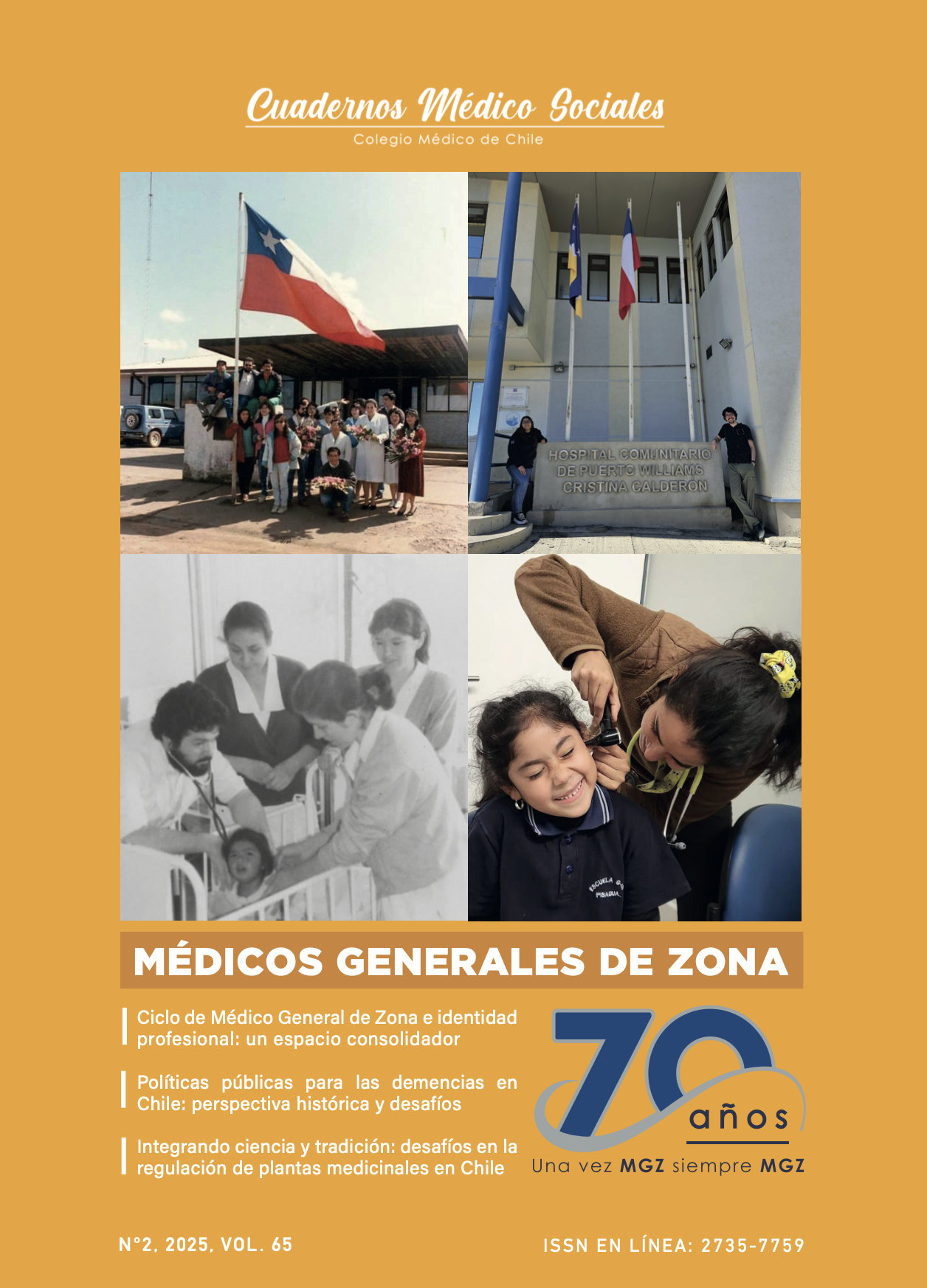Regional General Physician course and professional identity: a consolidating space
DOI:
https://doi.org/10.56116/cms.v65.n2.2025.2316Keywords:
Health System, General Practitioners, Professionalism, Social Identity, Professional PracticeAbstract
The Chilean general practitioner program, or the assigned and training phase, along with strengthening primary care in the healthcare network, is an excellent tool for medical training. Therefore, it is worth reflecting, based on current literature on medical training, on its role as a training space, in the development of professional identity, and in the strengthening of medical professionalism. This approach also includes the implications of this approach for its management in the medium and long term, with a view to proposing measures to strengthen this state policy.
Downloads
References
• Afshari, L., Young, S., Gibson, P., & Karimi, L. (2020). Organizational commitment: exploring the role of identity. Personnel Review, 49(3), 774–790. https://doi.org/10.1108/PR-04-2019-0148/FULL/PDF
• Barrera Q, F. (2016). Mi Experiencia como Médico General de Zona en Calbuco. Cuadernos Médico Sociales, 56(1–2), 33–41. https://cuadernosms.cl/index.php/cms/article/view/361
• Crenshaw, K. (2013). Demarginalizing the Intersection of Race and Sex: A Black Feminist Critique of Antidiscrimination Doctrine, Feminist Theory and Antiracist Politics. Feminist Legal Theories, 139, 23–51. https://doi.org/10.4324/9781315051536-2
• Diaz, X. (1972). EL MÉDICO GENERAL DE ZONA Imágenes de su trabajo , valores ocupacionales y estudio de satisfacción. Cuadernos Médicos Sociales, XIII(1).
• Hoffmann R., M. G. (2024). Evolución del Plan de Formación de Especialistas en Chile. Cuadernos Médico Sociales, 64(2), 91–99. https://doi.org/10.56116/cms.v64.n2.2024.1987
• Ilabaca P., E. (1967). Experiencia de un médico general de Zona en Los Vilos. 1964-1966. Cuadernos Médico Sociales, 8(2), 23–29. https://cuadernosms.cl/index.php/cms/article/view/2041
• Kunakov, N. (n.d.). Vista de La Identidad profesional en médicos, porque y como desarrollarla. Congreso en Docencia en Educación Superior Codes y I Congreso Latinoamericano y del Caribe de Innovación en Investigación en Educación Superior LatinsoTl La Serena, Chile. 8,9 y 10 de noviembre del 2023. Retrieved June 9, 2025, from https://revistas.userena.cl/index.php/codes/article/view/2000/2150
• Martínez-Clares, P., Martínez-Juárez, M y Muñoz-Cantero, J. . (2008). Formación basada en competencias en educación sanitaria: aproximaciones a enfoques y modelos de competencia. RELIEVE, 14(2), 1–23.
• Monrouxe, L. V. (2010). Identity, identification and medical education: why should we care? Medical Education, 44(1), 40–49. https://doi.org/10.1111/J.1365-2923.2009.03440.X
• Mount, G. R., Kahlke, R., Melton, J., & Varpio, L. (2022). A Critical Review of Professional Identity Formation Interventions in Medical Education. Academic Medicine, 97(11), S96–S106. https://doi.org/10.1097/ACM.0000000000004904,
• Noble, C., Young, J., Hourn, E., & Sheehan, D. (2020). Becoming clinical supervisors: identity learnings from a registrar faculty development program. Perspectives on Medical Education, 10(2), 125. https://doi.org/10.1007/S40037-020-00642-9
• Peña, S., Ramirez, J., Becerra, C., Carabantes, J., & Arteaga, O. (2010). Programme en faveur des praticiens ruraux du Chili: Stratégie pluridimensionnelle pour attirer et retenir les médecins dans les zones rurales. Bulletin of the World Health Organization, 88(5), 371–378. https://doi.org/10.2471/BLT.09.072769
• Pérez González, J. (2023). Professionalism and medical identity. Educacion Medica, 24(2). https://doi.org/10.1016/J.EDUMED.2023.100806
• Portales Orellana, C. I. (2022). Programa de médicos en etapa de destinación y formación (EDF) – ex médico general de zona: una alternativa para mejorar la estrategia de retención del plan de formacion de especialistas. Universidad de chile.
• Rodríguez, C., Archibald, D., Grad, R., Loban, K., & Kilpatrick, K. (2024). Professional identity work of nurse practitioners and family physicians in primary care in Quebec and Ontario – a study protocol. BMC Primary Care, 25(1), 1–10. https://doi.org/10.1186/s12875-024-02415-3
• Sarabia, S. (2015). Educación médica basada en competencias. Revista de Neuro-Psiquiatria, 78(3), 121. https://doi.org/10.20453/rnp.v78i3.2568
• Schrewe, B., & Martimianakis, M. A. (2022). Re-thinking “I”dentity in medical education: genealogy and the possibilities of being and becoming. Advances in Health Sciences Education, 27(3), 847–861. https://doi.org/10.1007/S10459-022-10095-W,
• Swick HM. (2000). Toward a normative definition of medical professionalism. Academic Medicine, 75(6), 612–616.
• Tsouroufli, M., Rees, C. E., Monrouxe, L. V., & Sundaram, V. (2011). Gender, identities and intersectionality in medical education research. Medical Education, 45(3), 213–216. https://doi.org/10.1111/J.1365-2923.2010.03908.X,
• Wald, H. S. (2015). Professional identity (Trans)formation in medical education: Reflection, relationship, resilience. Academic Medicine, 90(6), 701–706. https://doi.org/10.1097/ACM.0000000000000731
Downloads
Published
How to Cite
Issue
Section
Categories
License
Copyright (c) 2025 Pablo Salinas Carrizo

This work is licensed under a Creative Commons Attribution-NonCommercial-ShareAlike 4.0 International License.


